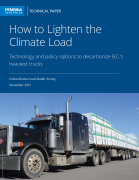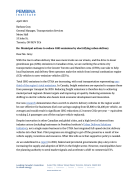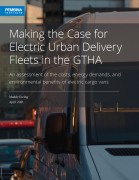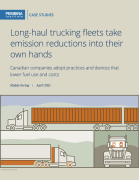Maddy Ewing's Research & Analysis
Transportation
November 1, 2021
Media Release
Report identifies policies, technologies to decarbonize heavy trucks
As freight emissions rise, Pembina Institute assesses options for difficult sector

Transportation
November 1, 2021
Publication
How to Lighten the Climate Load
Technology and policy options to decarbonize B.C.’s heaviest trucks


Transportation
April 30, 2021
Publication
Municipal actions needed to reduce GHG emissions by electrifying urban delivery
Letter to municipal governments in the Greater Toronto and Hamilton Area


Transportation
April 28, 2021
Publication
A guide to electrifying urban delivery fleets in Canadian cities
Why and how last-mile delivery companies should make the switch to electric vehicles
